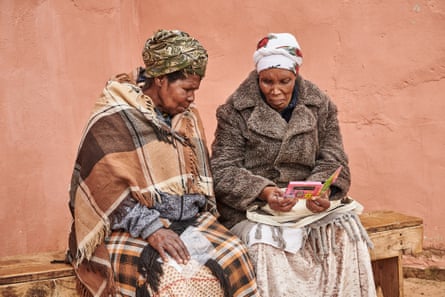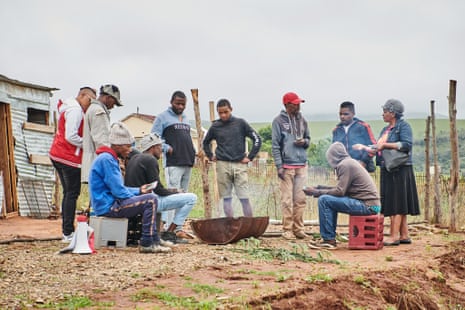Two years ago, Jocelyn Femele, 68, received a call from a relative, asking her to come and fetch her daughter, who was unwell. Femele travelled from her home in rural Eastern Cape to KwaZulu-Natal, where her daughter was living with her three children. For months, Femele cared for her, unaware of what was causing her illness. It was only after she died that she discovered her daughter had been HIV positive, and that her untimely death occurred because she had stopped taking her medication.

A report conducted by the South African HIV activist group Treatment Action Campaign (TAC) in 2021 found that 75% of patients at clinics and healthcare centres in Eastern Cape were living with HIV. Despite the numbers affected, access to information about HIV is a continuous struggle. The hurdles range from stigma and adult illiteracy to language barriers, high data costs and unreliable access to electricity.
Often, the only way to find out about treatment is at a healthcare centre, which in rural areas can be many miles away. Mahlatsi Sekete, a TAC community advocate who monitors local health centres, says even those who do make it to a facility are not guaranteed to receive adequate and accurate information.

-
In the town of Mount Fletcher, a group discuss the talking book, which has been designed to be accessible to all ages
“Under-resourced facilities rely on staff to provide information. Due to staff shortages, those on duty try to get through as many appointments, as fast as possible. There isn’t enough time to provide the one-on-one counselling that people need,” says Sekete.
In 2019, the South African government rolled out a new three-in-one antiretroviral (ART) drug, believed to have fewer side-effects. The drug also offers less chance of resistance. In a country that runs the biggest ART programme globally, serving 5.5 million users, information such as this can be life-changing.

HIV i-Base, a London-based organisation that provides support and information on treatment and living with HIV, launched ModernART 4 South Africa, a website and app, to ensure South Africans were kept informed of the new drug regime.
“We worked with TAC to create simply worded information in a variety of media and languages. But while this is available in our booklets and posters, as well as online, we had to make sure people in rural areas could access the same information – independently and without needing the internet,” says Polly Clayden, who runs HIV i-Base.
The innovative solution was a solar-powered “talking book”, called Starting ART, which narrates information about whether treatment actually works, how to take it and the possible side-effects.




-
Likelili Motia, a nurse, says the talking book will be a valuable tool at the Magadla clinic, outside Matatiele in the Eastern Cape; Prof Mtembu, a TAC trainer, speaks to commuters in Matatiele; Sindi Matashi demonstrates the book during a home visit in Ramafolo village
Hundreds of talking books – created in partnership with social enterprises Humanity Press, based in the US, and Creative Contracts, based in Cape Town – were distributed through a pilot project in Matatiele in Eastern Cape in November.
The aim was to allow people “to access valuable information that could provide behaviour change where it is needed”, says John Caldwell, co-founder and director of Humanity Press. Local TAC trainers travelled to rural areas, going door-to-door to hand out the compact, bright pink books. Made with a small solar panel, they can be charged on a window sill or any other source of ambient light.

Lying on the border of Eastern Cape and KwaZulu-Natal, in the foothills of the mountain kingdom of Lesotho, the area around Matatiele is scattered with remote villages where multiple languages are spoken. To reach as many people as possible, the books were recorded in Zulu, Xhosa, Sesotho and English.
Femele was one of the recipients of a book narrated in Xhosa. “If I had this book back then, I would have taken my daughter to the hospital to get help, it’s just that I didn’t know,” she says.
ModernART plans to continue the pilot rollout in 2023, distributing 2,000 talking books in rural areas through local TAC branches across South Africa.


